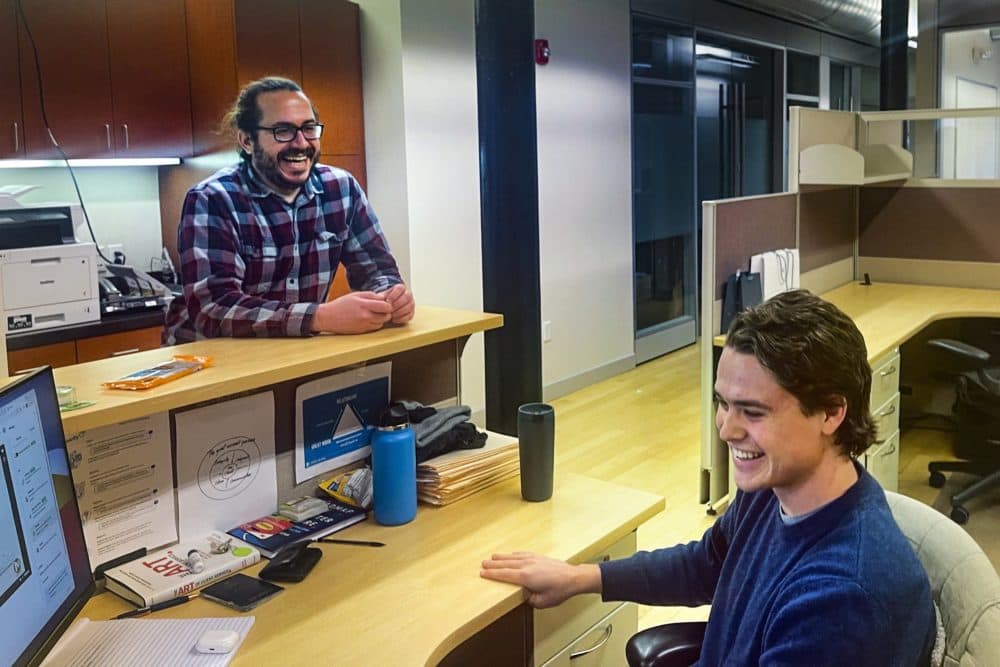Advertisement
In office? Remote? Why many companies are saying yes to both
ResumeFor the last two years, Jake DiMare, 47, got into a rhythm. His cat, Mr. Brea, would wake him up early begging for food. DiMare would then make his morning coffee and log on to his marketing job from his living room.
For him, like so many others who've been working remotely since 2020, the line between work life and home life started to blur. He began to feel isolated.
"I think we all joke about it, but it was pretty serious," DiMare said. "I was in pajamas for like a year!"
Before the pandemic, DiMare moved to Portland, Oregon, for work. He was away from his family and living in a new city where he didn't know anyone.
"I only knew my coworkers and the company said ‘everybody go home and stay away from each other,' " DiMare remembered. "So it was me and the cat sitting in this apartment alone for 16 months, basically."
While some workers, like DiMare, are excited to return to the office and resume something closer to pre-pandemic routines, many of their colleagues are choosing to keep working from home. In an effort to please both, Massachusetts companies are increasingly embracing a hybrid workplace. With it, come new challenges that underscore how the pandemic continues to impact daily life for many businesses and their employees.
COVID didn't just wreak havoc on DiMare's work and social life. It killed three of his family members: his uncle, grandfather and father.
DiMare doesn't want to forget this difficult time of his life. But he certainly wants to move on from it.
This year, he moved back to Greater Boston and took a new job as the vice president of marketing at a software startup called Voicify.
When his company recently announced that its 20 employees could to go back to the office on a voluntary basis, DiMare was thrilled about it.
On the first day back, DiMare went out to a Seaport restaurant with a few colleagues after work.

"It felt amazing," DiMare said. "I literally felt joy and that sense of hope that OK, maybe this is it. Maybe things are getting back to normal."
The Hybrid Future
A few days later, inside Voicify’s office in downtown Boston, DiMare spent the first few minutes catching up with colleagues. One of them was sporting a new mustache. Another talked about a recent ski trip.
Before starting a meeting, they conferenced in co-workers joining from home.
The future looks hybrid for Voicify, as it does for many other companies. Half of its employees are choosing to spend at least a couple of days in the office per week. That poses its own set of challenges, according to Lauren Jones, executive vice president of the Massachusetts Business Roundtable, a professional group for executives.
"Maintaining a sense of culture while employees are in different modes, on different days during the week is going to be something that employers, I think, will be paying close attention to moving forward," Jones said.
Before the pandemic, 90% of the organization's members, which include some of the largest employers in the state, operated in person, in what used to be the typical office model. Now, 80% say they plan to stay hybrid.
'It Might Come Down To Respect'
The dramatic shift to hybrid work is good news for people who aren’t excited about heading back in-person.
Jennifer Meredith, who works as an administrator in higher education, dreaded her hour-long commutes to Cambridge.
Remote work has been better for her mental and physical health. She exercises more, takes walks in the middle of the day and has more time to bake.
"I like who I am a lot better, and other people like this version of me where I’m nicer and feel better about myself and more energetic," Meredith said.
Her department is going back to the office once a week, but she doesn’t want that to be a gateway to a full return. To her, flexibility from an employer sends a strong message.
"It might come down to respect," Meredith said. "My employer, my direct supervisor knows what I’m doing, and they trust me that I'm doing what I need to be accomplishing, and that I’m meeting deadlines, and I'm hitting goals as opposed to feeling like you’re being watched or reviewed."
Whether employers like a hybrid workplace or not, they may have to accept it for now if they want to hold onto employees like Meredith. There are tradeoffs to consider, however, such as how emptier office buildings affect other businesses that can’t be remote. And there may be other long-term impacts on the economy, especially in Massachusetts.
"We're a state that trades on innovation and on technology and on creativity," said Michael Goodman, an economic sociologist at UMass Dartmouth. "I think there is a strong argument to be made that those things receive some assistance when people are co-located with one another."
In a study published in the journal in Nature, researchers observed more than 60,000 Microsoft employees over the first six months of 2020. They found that communication between the workers became more siloed after they switched to fully remote work.
DiMare says those moments in between the formal work — office banter or spontaneous hallway greetings — are part of the reason he's going into the office three or four times per week.
"It’s one of those things that most people don’t realize you’re going to miss it until it’s gone," he said. "Just seeing someone down the hallway and smiling at them and asking them how it was to go skiing last weekend. That stuff is important. It’s really meaningful, at least for me."
This segment aired on March 21, 2022.
